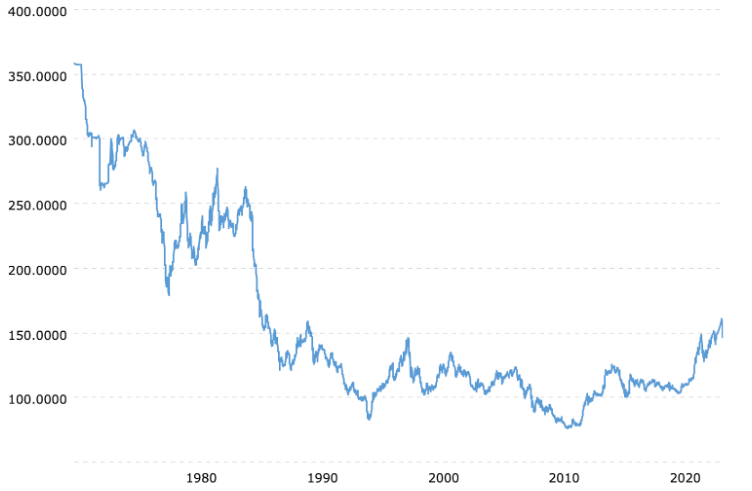Source: Reuters
Summary: The Dollar fluctuates as investors await critical US economic data. The USD rose against the Yen but remained relatively stable against other currencies. Expectations of potential US interest rate cuts influence market sentiment. Upcoming inflation and retail sales data will determine the likelihood of a more significant rate cut, impacting Treasury yields and Dollar strength.
Key takeaways
- Recession talk, in particular, has tended to boost the Yen and Swiss Franc as less risky, and this could weaken the USD
- The upcoming release of the producer price index (PPI) is expected to provide insights into broader inflationary trends and could further impact market expectations for interest rate cuts
- The Japanese Yen has strengthened due to a rally in the Japanese stock market, which has helped to stabilize Yen carry trades

Market impact
Increased volatility in currency markets
The impending release of crucial US economic data, particularly the CPI and retail sales figures, is expected to inject significant volatility into currency markets. As investors adjust their positions based on the data, exchange rates will likely experience sharp fluctuations.
Analysts believe a stronger-than-anticipated Consumer Price Index (CPI) and retail sales figures could lead to a sharp reversal in bond market expectations, with investors quickly pricing a smaller interest rate cut of 25 basis points. Meanwhile, they also predict headline and core CPI rates to come in at 3.0% and 3.2% year-over-year for July, respectively.
While acknowledging a cooling trend, they argue that inflation remains too high for the Federal Reserve to justify the market's current pricing of 100 basis points in rate cuts by year-end.
Bond market sensitivity to economic data
The upcoming economic data is also expected to impact the bond market substantially. Treasury yields will likely react strongly to the CPI and retail sales figures, with implications for borrowing costs and overall market sentiment.
A better-than-expected report could lead to higher yields, while cooler data might lower yields. Analysts anticipate a swift bond market reaction to the economic data releases, with investors potentially pricing in 50 basis points or more interest rate cuts in September.
Recession fears vs positive growth data
Despite recessionary anxieties reflected in futures markets, current economic data suggests positive growth, with the Atlanta Fed's GDPNow estimating annual growth of 2.9%. This might create uncertainty in the forex market. If investors believe in the positive growth narrative, demand for the US Dollar may increase, strengthening its value.
Conversely, if recession fears prevail, less risky currencies like the Japanese Yen and Swiss Franc could appreciate as investors seek refuge from economic downturn concerns.
What do experts say?
JPMorgan warns that a strong CPI and retail sales report could lead to a rapid reversal in bond market expectations, with investors pricing in a smaller 25 basis point rate cut. It quotes, ‘A hot CPI and hot sales would be the most volatile scenario, and see the bond market quickly repricing back to a 25bp cut’.
Conversely, a weaker-than-expected outcome could ease stagflation fears but reignite recession concerns, potentially resulting in a larger 50 basis point or more rate cut being priced in.
Future outlook
Dollar strengthens on hawkish Fed stance
A better-than-expected CPI and retail sales data could reinforce market expectations of a more resilient US economy. This could lead to a steeper yield curve, boosting the Dollar's appeal as a less risky and higher-yielding currency. The US Dollar index will likely appreciate against a basket of currencies.
Yen volatility continues amid policy uncertainty
The Bank of Japan's recent policy shift and the upcoming parliamentary session add to the uncertainty surrounding the Yen's outlook. The Yen will likely remain volatile, influenced by global risk sentiment, interest rate differentials, and any further policy announcements from the Bank of Japan. Carry trades involving the Yen could face increased risks.
Euro under pressure from geopolitical tensions
Escalating European geopolitical tensions, particularly related to the Russia-Ukraine crisis, could increase market uncertainty. A heightened risk-off environment might lead to a decline in the Euro as investors seek safety in traditional currencies like the US Dollar and Swiss Franc.
Sterling vulnerable to domestic economic challenges
The UK economy faces inflation, labor shortages, and Brexit-related uncertainties. These issues could dampen investor confidence in the British Pound if these issues persist or worsen. A weaker-than-expected economic performance might lead to a depreciation of the Sterling.
Actionable insights for traders
- Focus on high-impact economic data: The upcoming CPI and retail sales reports are expected to impact market sentiment and currency pairs significantly. Traders should closely monitor these releases and be prepared to adjust positions accordingly
- Increase volatility awareness: Given the potential for significant market movements based on economic data, traders should employ stop-loss orders and risk management strategies to protect their capital
- Consider position sizing: Traders might consider reducing position sizes to manage risk due to the heightened volatility anticipated around economic data releases
Actionable insights for investors
- Monitor inflation data closely: The CPI and PPI data will be crucial in determining the Fed's monetary policy path. Investors should rebalance portfolios based on inflation data
- Consider currency hedging: Given the potential for significant dollar volatility based on economic data, investors with international exposure might consider currency hedging to protect their portfolios from adverse exchange rate movements
- Utilize currency ETFs: Currency exchange-traded funds (ETFs) offer a convenient way to invest in a basket of currencies. Traders can invest in currency ETFs as this can provide diversification and exposure to different currency trends
Conclusion
Currency markets were volatile on Tuesday as investors awaited crucial U.S. economic data. The dollar's strength hinged on expectations of Federal Reserve rate cuts.
Weaker-than-expected data could fuel recession fears in the US while appreciating less risky currencies like Yen and Franc. Overall, market participants are cautious ahead of key economic releases.
Disclaimer: All material published on our website is intended for informational purposes only and should not be considered personal advice or recommendation. As margin FX/CFDs are highly leveraged products, your gains and losses are magnified, and you could lose substantially more than your initial deposit. Investing in margin FX/CFDs does not give you any entitlements or rights to the underlying assets (e.g. the right to receive dividend payments). CFDs carry a high risk of investment loss.




